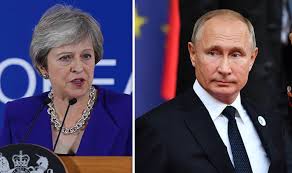Ties with UK should not deteriorate: Russia

London: Putting the brakes on the deterioration in relations between Russia and the UK would be a wise move on London’s part, a spokesperson for the Russian Embassy said when commenting on a statement from British Ambassador to Russia Laurie Bristow who said the UK was trying to “stabilize the relationship” between Moscow and London.
“We paid attention to a statement from Ambassador Laurie Bristow. We believe the nationals of both countries expect more from us than just stabilization at this low point. But if London is indeed interested in ending the continuous downturn in relations, it would be a move in the right direction,” the Russian diplomat said.
However, as one can see from the stories printed in the British media during the recent days, far from all people in the UK share this mood towards stabilization.
“We have seen a new cycle in the irresponsible campaign against the Russian Embassy and personally against the ambassador [Alexander Yakovenko], as well as a new wave of attacks against Russian business in the UK. It seems that the British authorities could work more actively in order to stop a wave of anti-Russian smears in the local media, stirring up hostile public sentiment towards our country,” the Russian diplomat said.
Focusing on allegations of so-called Russian ‘dirty money’ flowing into the UK, the spokesperson said that Moscow’s attempts “to establish efficient and productive bilateral cooperation in the fight against corruption and money laundering have come up against indifference from the British side to cooperate with law enforcement agencies and financial intelligence”.
“Hiding on UK soil are more than 50 Russian nationals accused in Russia of committing financial and other crimes and London refuses to extradite them under far-fetched pretexts,” the Russian diplomat stressed. He said that Russians are continuously intimidated by “unexplained wealth orders” against entrepreneurs who have seen no claims against them previously.
“Wouldn’t it be better to turn legal instruments against those whose criminal activity has been documented in detail by Russia’s law enforcement agencies?” the diplomat asked.
He urged the British authorities to start cooperating on all episodes of money laundering in Russia and the UK, information on which Britain received from Moscow but has been dragging its feet for years. Some documents have been returned to the Russian side “without substantive comments,” the diplomat stressed.
On March 3, the eve of the Salisbury incident, the Mail on Sunday tabloid said that two House of Commons members – Bob Seely, a Conservative, and Ian Austin, an Independent, sent a message to Foreign Secretary Jeremy Hunt requesting to closely examine allegations that the Russian ambassador, Alexander Yakovenko, had connections with Soviet intelligence services, the KGB and the GRU.
The Mail on Sunday claimed that its own inquiry allegedly produced evidence that Yakovenko was a Soviet intelligence agent while holding a diplomatic position at the USSR’s UN mission in the 1980s. The newspaper says that Yakovenko completed his foreign assignment and returned to Moscow precisely when a group of 25 Soviet diplomats had been expelled from the United States. US media sources in the Reagan administration referred to them as “senior [Soviet] intelligence officers.”
The Russian embassy in Britain has dismissed the charges as “crude lies,” and sent a letter to the Mail on Sunday’s editor-in-chief Ted Verity saying that the Russian ambassador was waiting for official apologies for the slander.





